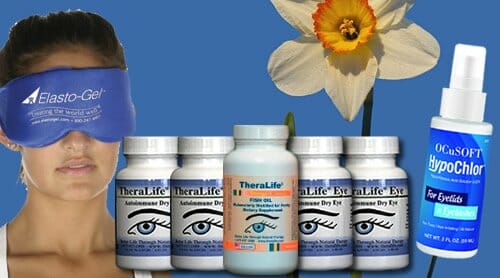Grave's Disease Dry Eyes- Relief using TheraLife
This is a personal story-Grave’s Disease Thyroid Dry Eyes- Relief by TheraLife Eye
I am a 48 year old woman who was diagnosed with Graves Disease 5 years ago. Graves’s disease tends to attack the thyroid gland as well as the eyes. My eye problem started about 4 years ago with severe dryness. I went to many doctors with NO Success!!! They only suggested I continue to put eye drops and ointments in my eyes. This actually exacerbated my problem. I became very desperate, and then found TheraLife on the internet. I found relief within a few weeks and have been on a dose of 2-4 pills ever since. I DO NOT use ANY eye drops or ointments anymore. The supplements totally keep my dry eye problem under control. Once in awhile, I need to take 6-8 capsules, but after a couple of weeks, I usually can go back to about 4. I am extremely happy and grateful for finding TheraLife.THANK YOU THERALIFE!!!
M. S., San Antonio, Texas
Graves’ disease is an autoimmune disorder that results in overactive thyroid gland (hyperthyroidism). It is caused by an abnormal immune system response which prompts the thyroid gland to produce too much thyroid hormone. Graves’ disease is most common in women over age 20. However, the disorder may occur at any age and may affect men as well
Dry Eyes and Graves’ Disease
Dry eye syndrome is very common amongst people with Graves’ disease. It is also called “thyroid eye disease”.
Thyroid eye disease is known to go through varying degrees of severity, and it can go into periods of remission. When it has been inactive for a period of around a half a year, it’s less likely to recur.
Dry Eye Symptoms in Graves’ Disease
- In addition to the typical dry eye symptoms of dry, irritated, gritty, light sensitivity.
- Swelling in the orbital tissues which causes the eye to be pushed forward — referred to as exophthalmos — which can make thyroid eye disease sufferers appear to have a wide-eyed or bulging stare.
- Bloodshot appearance to eyes
- Double vision (diplopia)
- Impaired vision
Treatments for Dry Eyes in Graves’ Disease
Your clear choice is TheraLife® Autoimmune. Our formula restores both tear volume and tear thickness – producing balanced sustainable tears for maximum comfort.
In milder cases of thyroid eye disease, typical treatments for dry eye syndrome work well. These include but are not limited to:
- TheraLife® Eye Autoimmune
- Wrap-around sunglasses to avoid wind and glare
- Room humidifiers for better comfort
- Prism lenses in eye glasses to reduce double vision.
- Short course of Prednisone to address eye swelling and redness
The Issue of Radioactive Iodine Treatment (RAI) for Graves’ Disease
Radioactive Iodine (RAI) treatment is the preferred treatment in the U.S. for Graves’ disease and its resulting hyperthyroidism. According to the New England Journal of Medicine, however, radioiodine therapy for Graves’ hyperthyroidism is more likely to apparently cause or worsen thyroid eye disease than is anti-thyroid drug therapy. This worsening can be temporary however, and may in some cases be prevented by use of the steroid prednisone.
How does TheraLife Eye Autoimmune Work? to read
- Restore normal cell functions to tear secretion glands and salivary glands.
- Regulate immune system to reduce flares
- Learn More
- Customer Testimonials.
What is in TheraLife Autoimmune?
The formula is fortified with:- Immuno-modulators - to help modulate and normalize the immune system
- Anti-inflammatory - to reduce irritation and inflammation of the tear, salivary glands, eye surface, eyelids, and joints
- Anti-fatigue agents - to stimulate micro-circulation and boost energy.
Why Omega 3 Fish Oil?
We highly recommend molecularly distilled TheraLife Omega 3 Fish Oil in addition to TheraLife Eye Autoimmune formula to take advantage of its strong anti-inflammatory and anti-oxidation properties. Read more
Buy now.
Call and talk to a doctor toll free 1-877-917-1989 United States and Canada
International (650) 949-6080
email to : info@theralife.com
Visit us at twitter and facebook.






